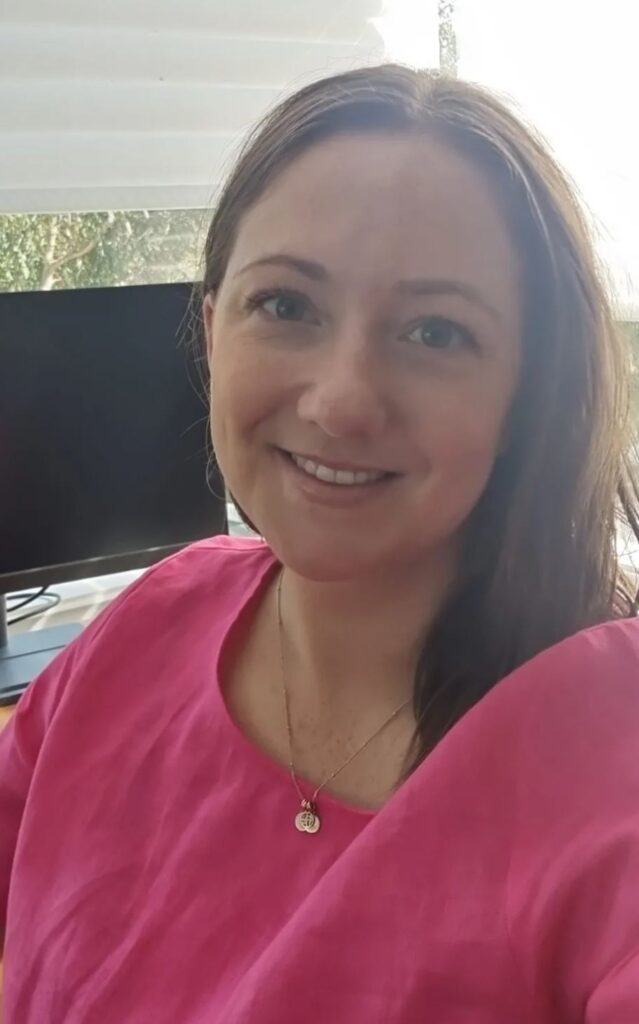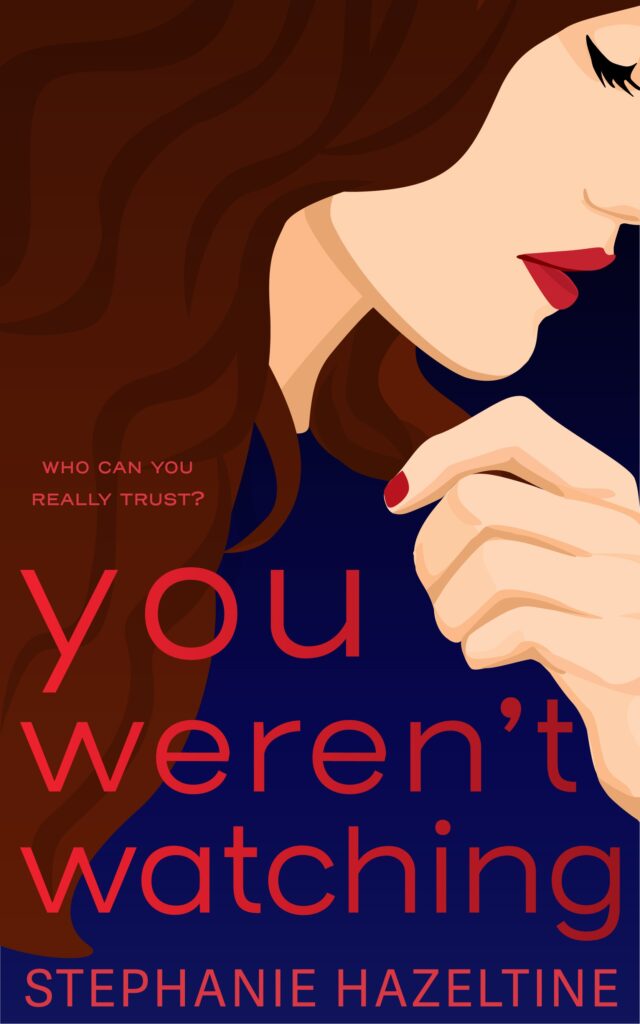As a primary school teacher, Stephanie Hazeltine always thought she’d write children’s books one day – but when she started writing, it was the heart-racing thriller genre that got her hooked. She’s just released her second domestic thriller novel, You Weren’t Watching, which is book two in her Suburban Secrets series.
I was delighted to work with Stephanie on a line and copy-edit for You Weren’t Watching earlier this year, so I know just how much readers are going to love this book! It’s a pacy read that centres around the nightmare of a child’s disappearance, but also touches on postnatal anxiety and depression, the challenges of motherhood and co-parenting, and the knotty complexities of female friendships.
Here, Stephanie shares how she got into writing, dealing with confronting themes in fiction, and how she navigates the self-publishing journey.
Tell us a little bit about yourself and your new novel, You Weren’t Watching.
I live in Melbourne with my husband, two kids and two cavoodles. I’m a primary school teacher who loves reading, running and Caramilk chocolate. I got into writing during lockdown and haven’t looked back – I’m constantly plotting stories and trying to find the time to write them all.
You Weren’t Watching is an interconnected standalone novel in the Suburban Secrets series. It centres around a group of women and their children in the quiet suburb of Rosewood. When one of the children is kidnapped, the women must come together. But with every passing moment, more horrifying secrets are uncovered and it’s a race against time to save more than just one Rosewood resident.
You Weren’t Watching throws you into every parent’s worst nightmare and makes you question who you can really trust.
What made you want to be an author?
I actually wanted to be a children’s author originally because I loved reading to my students and sharing different books with them. Then a friend encouraged me to do a creative writing course and that sparked the desire to write novels.
How did you get started?
I started with a writing course that I completed during lockdown with a newborn baby. It started as a distraction from newborn monotony and lockdown boredom, but I fell in love with creating and it’s taken off from there.
“I want my characters to be relatable and authentic so I try to inject a bit of myself into (some of) them. The status quo before things get thrilling is what my life often looks like.”
What draws you to writing domestic thrillers centring on women’s lives?
I want my characters to be relatable and authentic so I try to inject a bit of myself into (some of) them. The status quo before things get thrilling is what my life often looks like. It’s centred around my children, my family, my friendships. I love to read thrillers, so turning that everyday life into something devastating or scandalous is fun.
There’s some confronting themes and storylines in your work – does this involve lots of research to ensure you’re getting the details right?
I have some lovely friends and family who work in emergency services, law enforcement and legal proceedings and they keep me on track so that my details are pretty accurate.
The mental health theme, particularly perinatal mental health, is something I’m really passionate about. I suffered postnatal depression and anxiety when my first child was born and it took me some time to realise that it’s totally fine and very common, and I wanted to highlight this in my books so that women who read them realise that too. I’ve had a lot of mothers reach out and thank me for discussing perinatal mental health. It’s also been a really therapeutic way of sharing some of the feelings I’ve experienced through my characters.
How do you protect your own mental health while exploring such dark content?
It probably seems odd but writing itself is one of the ways I protect my mental health. It’s a creative and emotional outlet for me, even when the content is dark.
Have you learnt anything that you weren’t expecting about dealing with sensitive material in fiction?
Not from my books yet, but from working with other authors and speaking with readers, it can certainly be a real minefield. Almost anything can warrant a trigger warning and we don’t know what our readers have experienced. I try to be as transparent as possible and list the trigger warnings at the front of my books.
You’re an indie author – why did you decide to go down the self-publishing path?
The first answer that comes to mind is the fear of rejection. But in addition to this, I really like having control over what and when I create and release my work. I set my own deadlines and keep them realistic around being a mum and a part-time teacher.
What are the challenges involved in self-publishing? And do you have any advice for others who might be considering the indie route?
The hardest part, for me, has been marketing and getting eyes on my book. I feel I spend almost an equal number of hours writing as I do marketing and admin tasks, and that makes me sad because I love writing. As I become more experienced, I’m sure this will change but for now it’s a juggle.
My advice for others would be to establish some friendships/relationships with other indie authors because their knowledge is golden. I could not have navigated editing, formatting, uploading to different distributers, marketing etc without the people I met along the way who had already self-published.
“My advice for others would be to establish some friendships/relationships with other indie authors because their knowledge is golden.”
How essential is working with an editor (or several editors!) as part of this process?
Crucial! For both of my books I have had an editor do a structural report very early on in the project and then a line edit at the end. As a self-published author, it’s all on me. There’s no publishing company to fall back on. So when my book goes out, I want it to be perfect because it represents my name only. Having an editor gets me as close to perfect as I can hope.
Who else is essential on your publishing team?
A cover designer, beta readers (I’ve got three plus a proofreader) and ARC readers who I have reached out to over social media. I’m also part of two writing groups and we talk all week sharing motivation and ideas – and a really good barista.
What’s next for you – when can we expect the next instalment in your series?
The next instalment in the Suburban Secrets series won’t be until next year but I’m hoping to release a completely separate thriller later this year. Stay tuned.
Where’s the best place for people to buy your books?
Paperback copies are available on Amazon. Otherwise you can get the ebook on Kindle, Apple, Kobo or Nook.
Find out more about Stephanie on her website and stay up to date on her books over on Instagram @stephaniehazeltinewrites


